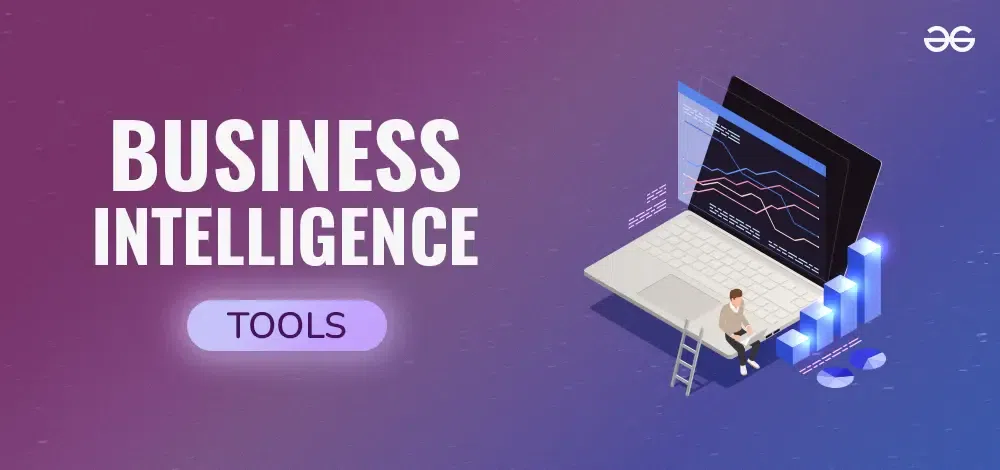Business Intelligence mainly uses or combines data mining, business analytics, data tools, data visualization, and infrastructure to help the organization make more data-driven decisions. There are various different Business intelligence tools that are used to collect, process, and analyze large quantities of data for transferring the raw data to a useful one.
Therefore, in this article, a comprehensive overview has been provided about Business Intelligence and the top 9 business intelligence tools that will be used by organizations in 2024.
What is Business Intelligence?
Business Intelligence is defined as the technical infrastructure or procedure that helps to collect, analyze, and store the data that is produced by the company’s activities. Therefore, BI is mainly a set of technologies and strategies that are used by enterprises for data analysis and management of business information. Business Intelligence’s main objective is to help inform and improve the business decision making the data easier to interpret.
Top 9 Business Intelligence Tools
There is a wide range of business intelligence tools available in the market that organizations use to make well-informed decisions. These tools enable businesses to collect, analyze, and visualize data from various sources, providing valuable insights for strategic planning and performance monitoring. Here are some of the top 9 business intelligence tools for 2024 that can help organizations enhance their decision-making process and drive business growth.
1. Microsoft Power BI
Power BI is one of the popular BI Tools that offers both cloud-based and desktop applications for sharing reports and dashboards. This BI tool has the ability to transform and visualize the data. It provides users with multiple technical skill levels such as Power BI Desktop, Power BI Mobile, and Power BI Service.
Key Features
- Microsoft Power BI provides a real-time data refresh feature.
- It consists of built-in AI capabilities which are used to discover the trends, patterns, and anomalies in the data.
- Sharing the reports and dashboards with the other team members becomes easy.
- It consists of a user-friendly interface with a drag-and-drop report builder feature.
2. Looker Studio
Looker Studio formerly known as Google Data Studio is designed for developing customized, interactive reports and dashboards that can integrate with multiple data sources. It is a free tool that mainly focuses on speed and helps users to create data visualization and reports further making the data accessible.
Key Features
- Real-time collaboration and drag-and-drop report builder features are available.
- It is used for sharing and embedding of reports.
- It can directly integrate with Google Sheets, Google Analytics, and other Google services.
3. Domo
Domo is one of the popular cloud-based BI platforms that mainly offers easy-to-use data visualization and reporting capabilities. It is one of the best BI tools due to its user-friendly interface and pre-built connectors. This BI tool also provides the ability to explore, analyze, and collaborate on data-driven insights.
Key Features
- Domo provides a low-code or no-code to automate the workflow and charts.
- It consists of more than 1000 pre-built connectors.
- This BI tool comes up with Artificial Intelligence to enhance decision-making.
4. Tableau
Tableau is a popular BI tool that mainly focuses on usability and for non-technical users. It can integrate with multiple applications by using the pre-built data connectors, along with visualization and data discovery capabilities. This BI tool allows the users to answer pressing questions within seconds.
Key Features
- Tableau consists of a wide range of data connectors for every kind of data source.
- It is a type of interactive dashboard where the users can either create and automate or throw together quick ad-hoc analyses of data.
- The real-time data analysis of Tableau allows the users to visualize and analyze the live data.
5. Sisense
Sisense is another famous cloud-based BI tool that is known for its incredibly fast data analysis capabilities due to its unique data architecture which particularly combines data preparation, data visualization, and data modeling into a single platform. It mainly focuses on designing a no-code user experience with a feature drag-and-drop dashboard builder.
Key Features
- The in-chip data engine of Sisense is designed for high-speed data processing and it can also handle large datasets easily.
- It consists of a single-stack architecture for data analysis and preparation.
- It consists of a drag-and-drop dashboard builder which makes this tool more accessible.
6. Zoho Analytics
Zoho Analytics is a famous Business Intelligence tool which makes this tool are great fit for beginners and small businesses. It mainly offers sharing and publishing options which allow the users to easily develop and analyze reports with colleagues and friends. This tool also helps the users to analyze with an intuitive dashboard and multiple visualization options.
Key Features
- Zoho Analytics consists of pre-built widgets and dashboards.
- This tool is integrated with over 250 data sources and a direct connection of above 50 data applications.
- It offers self-service data preparation and management.
7. Mode
Mode is another famous business intelligence tool that helps data analysts collect, visualize, and analyze data that business users can consume to gain some informational insights and it also makes data-driven decisions. With the help of mode, users can connect to diverse data sources, schedule reports, and develop data models.
Key Features
- With the help of mode, users can develop code-free interactive reports and dashboards which saves time.
- It helps in performing complex predictive and statistical analyses.
- Mode helps in developing powerful internal tools and customer-facing reporting.
8. SAP Business Objects
SAP Business Objects are popularly referred to as SAP BO. This tool is a centralized suite that is used for visualization, sharing, and data reporting. It provides self-service visualization tool to combine the data, analyze the trends, and tell the stories. It enables the users to search through large volumes of data from multiple resources.
Key Features
- By using SAB Business objects users can develop reports and analytical dashboards to gain insights from the data.
- With the help of this tool, users can share reports and dashboards with their team members.
- Real-time analytics is possible by using this tool.
9. Qlik Sense
Qlik Sense is a BI tool used for analyzing and visualizing the data. This tool helps in developing interactive dashboards and reports. It mainly offers modern analytics which empowers the users at all skill levels to uncover important insights. Qlik Sense helps users use the data and solve problems, fulfill new objectives, and address business needs.
Key Features
- With the help of Qlik Sense users can build their own analytics and reports without IT support.
- This tool allows the users to explore data and discover hidden insights within it.
- Users can develop interactive visualizations such as tables, graphs, and charts.
Must Read:
Conclusion
Business Intelligence mainly gives organizations the ability to ask questions in plain language and also get solutions that they can understand. These business intelligence tools are used for numerous purposes such as fast decision-making, analytics, reporting, and so on. Therefore, in this article, detailed knowledge has been provided about business intelligence, business intelligence tools, and the top 9 business intelligence tools to use in 2024.
FAQs
What do you mean by Business Intelligence?
Business Intelligence is mainly a process of procedural and technical infrastructure which collects, analyzes and stores the data. It mainly combines the data tools, business analytics, data visualization and infrastructure and the other best practices to make more data-driven decisions.
What do you mean by BI Tools?
Business Intelligence tools are the software, applications and programs are designed to help locate, retrieve and analyze the documented data. These tools are designed in such a way to make the flow of data manageable and allow the organizations to transform the unstructured data into useful insights.
What is the use of BI tools?
BI Tools are the open-source application which are mainly used to collect, analyze and process the large amounts of structured and unstructured data from the external and internal systems.





